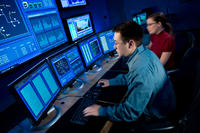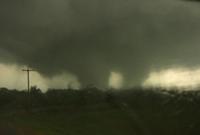-
Companies urged to limit sale of surveillance tech to repressive regimes
The European Commission is urging private companies to limit the sale of surveillance technology to foreign countries that “repress” their people
-
-
Shell fears cyberattack on oil infrastructure
Oil executives fear that a cyberattack on critical infrastructure could wreak havoc by destroying facilities or disrupting production
-
-
DSIT in $12.3 million order for underwater security systems

DSIT Solutions receives its largest order ever for underwater security systems; the contract calls for the delivery of a large number of AquaShield Diver Detection Sonar (DDS) and PointShield Portable Diver Detection Sonar (PDDS) systems to protect offshore oil platforms, coastal energy terminals, and high value vessels against underwater intrusion and sabotage
-
-
Right degree helps grads compete in DHS hiring boom
Even amid the economic downturn, students who graduate with degrees in homeland security can breathe a bit easier knowing that they are more likely to find jobs than their fellow graduates; the agency’s hiring boom is expected to continue over the next several years as more and more baby boomers in their 50s begin to retire
-
-
Senate stalls on easing visa restrictions for highly skilled immigrants
A bill meant to allow more high-skill immigrants from India and China to obtain green cards has been placed on hold by Senator Charles Grassley (R-Iowa) over concerns that it should do more to “protect Americans at home”
-
-
Court rules in favor of American Airlines in $30 million dispute with TSA

On Tuesday a U.S. Court of Appeals ruled against DHS ordering the agency to review its decision to deny reimbursing American Airlines $30 million for the additional security procedures it had been asked to put in place by the Transportation Security Administration (TSA) following the 9/11 attacks
-
-
U.S. 2011 billion-dollar disasters
The National Oceanic and Atmospheric Administration (NOAA) has recalculated the number of weather disasters in the United States which passed the billion dollar mark; NOAA added two disasters, pushing the 2011 tally to twelve billion-dollars-or-more disasters; these disasters caused more than 1,000 deaths and inflicted damaged estimated at $52 billion
-
-
Iridium offers emergency response service on satellite phone
Iridium offers free SOS service on its Iridium Extreme satellite phone; individuals who need emergency help can now maintain contact with an operator during the emergency rather than rely on one-way SOS alerting
-
-
New severe-weather alert service launched
Reddaway has announced a new Service Alert process that will inform customers about situations that may impact their supply chain
-
-
CBP buys new risk management tool
Customs and Border Protection (CBP) Office of Technology Innovation and Acquisition (OTIA) is replacing existing risk management systems with a product from a U.K. company to bolster the department’s risk and opportunity management capabilities
-
-
Safer fertilizer technology

Honeywell will build a facility in California to produce a fertilizer with the agronomic benefits of traditional nitrate-based fertilizers, but with significantly lower explosive potential; the new fertilizer was independently tested, with guidance from the DHS and the Bureau of Alcohol, Tobacco, Firearms and Explosives, and demonstrated significantly less or no explosive power
-
-
Lockheed Martin UK opens its U.K. cybersecurity center

Lockheed Martin UK has officially opened its first Security Intelligence Center (SIC) at Farnborough; the role of the SIC will be detection, identification, and response to information security incidents; this is accomplished by bringing together three primary capabilities: pervasive sensors, data management, and analyst collaboration
-
-
Real disasters hurt annual national disaster drill

This year the federal government’s annual nationwide disaster drill was hampered by actual disasters; due to an unusually severe series of natural disasters across the country, several states, local agencies, and federal employees were unable to participate in the Federal Emergency Management Agency’s National Level Exercise as they were too responding to real emergencies
-
-
Increased use of UAVs leads to new job opportunities
The growing importance of unmanned aerial vehicles (UAVs) is producing new job opportunities across the United States, with more likely to come as drones enter the civilian realm; the Association for Unmanned Vehicle Systems International estimates that 23,000 jobs could be added over the next fifteen years if drones are allowed in U.S. skies
-
-
DHS to equip border agents with new body armor
The Customs and Border Protection buys $48,629,750 worth of personal body armor from North Carolina-based KDH Defense systems
-
- All
- Regional
- Water
- Biometrics
- Borders/Immig
- Business
- Cybersecurity
- Detection
- Disasters
- Government
- Infrastructure
- International
- Public health
- Public Safety
- Communication interoperabillity
- Emergency services
- Emergency medical services
- Fire
- First response
- IEDs
- Law Enforcement
- Law Enforcement Technology
- Military technology
- Nonlethal weapons
- Nuclear weapons
- Personal protection equipment
- Police
- Notification /alert systems
- Situational awareness
- Weapons systems
- Sci-Tech
- Sector Reports
- Surveillance
- Transportation
Advertising & Marketing: advertise@newswirepubs.com
Editorial: editor@newswirepubs.com
General: info@newswirepubs.com
2010-2011 © News Wire Publications, LLC News Wire Publications, LLC
220 Old Country Road | Suite 200 | Mineola | New York | 11501
Permissions and Policies
Editorial: editor@newswirepubs.com
General: info@newswirepubs.com
2010-2011 © News Wire Publications, LLC News Wire Publications, LLC
220 Old Country Road | Suite 200 | Mineola | New York | 11501
Permissions and Policies
